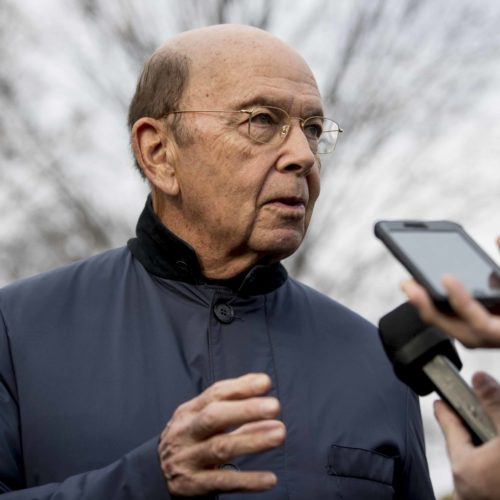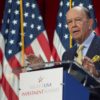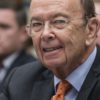Introduction
Dec. 20, 2:30 p.m.: This story was updated.
U.S. Commerce Secretary Wilbur Ross twice submitted sworn statements to ethics officials saying he had divested stock that he in fact still owned, a new document obtained by the Center for Public Integrity reveals.
The disclosure, in a new filing by Ross, represents the latest in a series of inaccurate statements and omissions in Ross’ personal financial statements since President Donald Trump tapped him as Commerce secretary in late 2016.
Ross was supposed to sell his BankUnited, Inc. stock, valued at up to $15,000, within 90 days of his Senate confirmation, according to his federal ethics agreement — in other words, by the end of May 2017.
Ross twice submitted disclosure reports to federal ethics officials saying he had divested the stock — once in a transaction report from May 2017 and another time in his annual financial disclosure from August 2018.
But in October, Ross filed another transaction report with ethics officials acknowledging he had had not divested the BankUnited stock when he said he did — and continued to own it until October 1, 2018. The Office of Government Ethics has not yet certified this latest transaction report, but released the document in response to a request from the Center for Public Integrity.
Ross acknowledged he had previously reported selling the stock, and said he had done so “based on a mistaken belief that the agent executed my sell order on that date.”
In both previous reports, Ross certified that “the statements I have made in this form are true, complete and correct to the best of my knowledge.”
In a brief statement emailed in response to questions from the Center for Public Integrity, Ross said the October transaction reported “corrected an earlier filing,” and reiterated that he had believed the shares were sold on May 31, 2017, when he originally reported divesting them.
The BankUnited stock comprises a tiny fraction of the wealthy Ross’ assets, but it is the latest example of Ross failing to divest something he said he had sold. He had previously failed to sell his Invesco Ltd. stock, valued at between $10 million and $50 million, until December 2017, even though in November 2017, he had told federal ethics officials he had complied with his ethics agreement and divested everything he had been required to divest.
In July, the Center for Public Integrity reported the stock’s value increased by between about $1.2 million to $6 million over its value at the end of May, depending on Ross’ actual number of shares.
Ross had also previously reported late divestitures of stock in Sun Bancorp Inc., the Greenbrier Companies Inc. and Air Lease Corp. In all cases, he said he had been unaware that he had still owned the stock, and moved to divest it when he found out. He has also faced other questions about his handling of potential conflicts of interest.
In July, the acting head of the Office of Government Ethics, David Apol, sent Ross an unusually blistering letter about his disclosure problems. Apol wrote that Ross’ failure to divest assets by the deadline in his federal ethics agreement “created the potential for a serious criminal violation on your part and undermined public confidence.”
Apol urged Ross to devote the resources necessary to ensure that the report he was required to file in August and all future reports “are complete and accurate.”
In response to that letter, Ross issued a statement saying he took his ethics obligations seriously, and his errors had been inadvertent.
The Senate confirmed a new director of the Office of Government Ethics, Emory Rounds, in July. OGE did not respond to a request for comment about whether it would take additional steps regarding Ross’ compliance with his ethics agreement, or why it had not yet certified and released Ross’ most recent transaction report.
Ethics watchdogs said Ross no longer deserves the benefit of the doubt.
“This is the latest in a series of omissions and claimed mistakes that have begun to add up to something that looks very suspicious,” said Austin Evers, executive director of American Oversight, a nonprofit watchdog group. “Wilbur Ross clearly is not taking his ethics obligations seriously. He’s been warned and at this point he needs a full audit by OGE and probably Congress to make sure he’s not operating with blatant conflict of interest.”
Delaney Marsco, ethics counsel for the Campaign Legal Center, a nonprofit watchdog group that has called for the Commerce Department’s inspector general to investigate whether Ross violated conflict-of-interest laws and statutes governing false statements and omissions, said Ross’ mistakes defy logic.
“There are rules in place,” she said, adding that if he had followed OGE’s instructions to carefully vet his August financial disclosure, he would have realized sooner than October that the stock had not been sold. “It shows a lack of reverence towards the ethics program and a disregard for the rules,” she said.
Members of Congress have also repeatedly called for investigations into Ross’ handling of his personal financial holdings.
Sen. Ron Wyden, D-Ore., the ranking member of the Senate Finance Committee, has asked the Department of Justice to investigate. Sen. John Thune, R-S.D., has asked the Commerce Department inspector general to examine whether Ross violated conflict of interest laws.
In a statement issued to the Center for Public Integrity Thursday, Wyden said the new documents “show that Secretary Ross yet again made false statements about selling off stocks that presented a conflict of interest for him. This administration’s contempt for the most basic checks on corruption is bottomless.”
Read more in Money and Democracy
Money and Democracy
Controversial J&J drug pushed by Trump is nixed from VA’s pharmacy list
Experts question Spravato’s safety and effectiveness.




Join the conversation
Show Comments